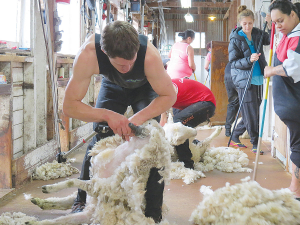M.I.A.
OPINION: The previous government spent too much during the Covid-19 pandemic, despite warnings from officials, according to a briefing released by the Treasury.
 The Shearing Contractors Association has put out a set of guidelines on shearing in conjunction with Fed Farmers, which has been provided to MPI and Beef+Lamb.
The Shearing Contractors Association has put out a set of guidelines on shearing in conjunction with Fed Farmers, which has been provided to MPI and Beef+Lamb.
Shearing has been deemed an essential service, but people must come first, says Mike Barrowcliffe, NZ Shearing Contractors Association president.
“The last thing an 80-year-old farmer wants is a whole lot of young people who haven’t been self-isolating turning up to his place to shear his sheep,” he says.
Everyone should put safety first throughout the whole supply chain – from the farmers themselves to contractor employees, Barrowcliffe told Rural News.
“They need to ask the questions, is it essential and can it wait?” he says.
He says while everyone wants to go to work, not all can at the moment for many different reasons.
“We have to be mindful and respect people’s opinion. They might have an underlying health issue; someone they are caring for may have one or it may just be the age demographic.”
Barrowcliffe says everyone is taking Covid-19 very seriously.
“The self-isolation, the farmers preparing their work sites, what the shearing contractors are doing to get their staff to work, and while at work and once they have left work as well.”
He says animal welfare issues also must have priority.
“Let’s use preventive animal welfare issues rather than reactive ones.”
The New Zealand Shearing Contractors Association has put out a set of guidelines in conjunction with Federated Farmers which has been provided to MPI and Beef+Lamb.
“As long as everyone follows those and respects the intent of those well, I can’t see a problem with the current information we have and how to manage or control Covid-19.”
He says with so many jobs and tasks in farming you have to apply the rules as is required to each situation.
Barrowcliffe adds that flexibility is needed, but so is social responsibility.
“Reinforcing that yarn that farmers need to be proactive and think about what essential jobs are coming up, put steps in place to make sure that their work sites are set up for us to enter and for us to make sure we have got suitable staff that can come on and do the job for them.”
One of New Zealand’s longest-running pasture growth monitoring projects will continue, even as its long-time champion steps away after more than five decades of involvement.
The Insurance & Financial Services Ombudsmen Scheme (IFSO Scheme) is advising consumers to prepare for delays as insurers respond to a high volume of claims following this week's severe weather.
Additional reductions to costs for forest owners in the Emissions Trading Scheme Registry (ETS) have been announced by the Government.
Animal welfare is of paramount importance to New Zealand's dairy industry, with consumers increasingly interested in how food is produced, not just the quality of the final product.
Agriculture and Forestry Minister Todd McClay is encouraging farmers and growers to stay up to date with weather warnings and seek support should they need it.
The closure of SH2 Waioweka Gorge could result in significant delays and additional costs for freight customers around the Upper North Island, says Transporting New Zealand.